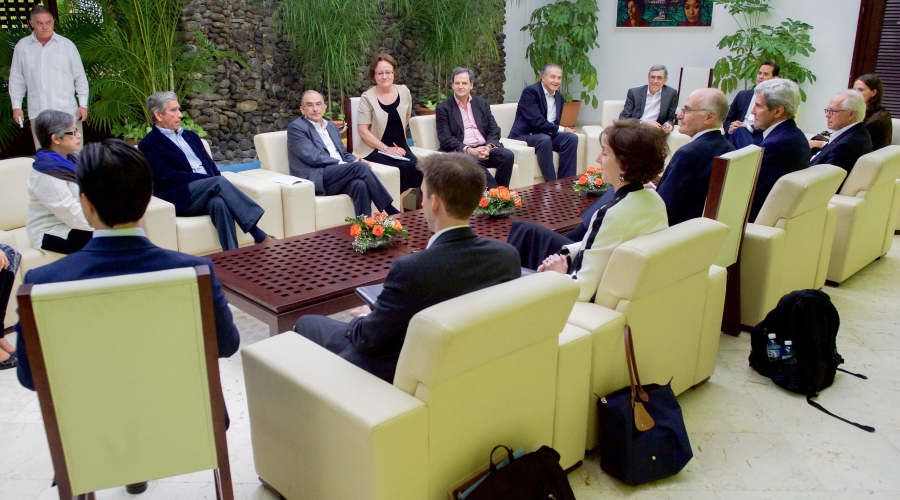Using a Terrorism List to Squeeze Cuba and Venezuela
The State Department's decision to add Cuba to the Not Fully Cooperating Country list could signal a more aggressive policy.

Published by The Lawfare Institute
in Cooperation With

Editor’s Note: The State Department recently added Cuba to the list of countries that are not cooperating fully on counterterrorism, a reversal of Obama administration efforts to improve relations with Havana. Jason Blazakis of the Middlebury Institute of International Studies argues that this is part of a broader effort to squeeze Cuba and Venezuela that may even include adding them to the State Sponsors of Terrorism list—a move, he argues, that is likely to do little other than further discredit U.S. counterterrorism efforts.
Daniel Byman
***
On May 13, the U.S. Department of State issued a press release explaining it had certified to Congress that five countries—Cuba, Venezuela, Iran, Syria and North Korea—were “not cooperating fully” with U.S. anti-terrorism efforts pursuant to Section 40(a) of the Arms Export Control Act. Also known as the Not Fully Cooperating Country (NFCC) list, these yearly certifications to Congress made by the State Department typically go under the radar. The tough-hitting language in the State Department’s press release may be an indication that even more robust sanctions are on the horizon for Cuba and Venezuela.
Generally, the State Department will submit a little-read Federal Register Notice explaining that either the secretary or the deputy secretary of state has determined which countries are not playing their part in tackling terrorism. In 2019, for instance, the State Department simply issued a Federal Register Notice explaining that four countries—Iran, North Korea, Syria and Venezuela—were not cooperating. While the recent State Department press release has precedent, it is rare. In 2004, the State Department issued a press release meant to send a signal to Libya: “Libya has taken significant steps to repudiate its past support for terrorism …. When our review of Libya’s overall record is complete, we will consult further with the Congress.” At the time, Moammar Gadhafi had been negotiating Libya’s reintegration into the international community, and the State Department’s higher profile listing of Libya on the NFCC list could have been intended to further pressure Gadhafi to implement his commitments to cooperate with U.S. counterterrorism efforts and finally dismantle his weapons of mass destruction program. In 2006, less than two years later and after clear follow-through from Libya, the country was removed from a much more important list, the State Sponsors of Terrorism (SST) list.
The State Department’s recent announcement may indicate that similar significant policy shifts are afoot. The addition of Cuba provides an important clue. Now, it should be emphasized that Cuba has been on the NFCC list before, as recently as 2015, and Cuba was also on the SST list from 1982 to 2015. I was the head of the office that managed SST issues, among other things, at the State Department when Cuba’s SST tag was removed in 2015. It was clear to many of us that SST sanctions were not getting the desired result of a democratic Cuba. Moreover, it was legally determined that Cuba was not actively engaged in violence that could be defined as terrorism under any credible definition of the word. Our strategy shifted, and the SST sanction was rescinded with the hope that change in Cuba could occur via person-to-person engagement.
Prior to the May 13 decision to add Cuba back to the NFCC list, the Trump administration was dialing up its rhetoric and travel-related sanctions against the Cuban government. In October 2019, for instance, U.S. Special Representative for Venezuela Elliott Abrams explained that “[w]e’re always looking to squeeze [Cuba].” More recently, Secretary of State Mike Pompeo said the Cuban deployment of doctors to South Africa and Qatar to help fight the coronavirus pandemic was akin to human smuggling. The combination of tough statements and sanctions against Cuba presaged the May 13 decision to add Cuba back to the NFCC list. And, in reviewing the press release, I believe there is a good chance that the Trump administration may add Cuba back to the SST list as well. Specifically, the State Department press release explained that Cuba was harboring members of Colombia’s National Liberation Army (ELN) who were originally deployed to Havana in 2017 when the Cuban government hosted peace talks between the ELN and the Colombian government. Those talks, part of an effort to stop a conflict that has been ongoing since 1964, sadly, fell apart. Some of the ELN negotiators never returned to Colombia, and the government of Colombia requested their extradition, which Cuba promptly refused. Pursuant to U.S. laws that undergird SST listings, a country can be added to the SST list if it provides sanctuary to a terrorist group, and because the ELN is labeled a foreign terrorist organization by the U.S. Department of State, the sanctuary provided to the ELN could be used as a legal basis for rebranding Cuba as a state sponsor of terrorism.
The State Department’s May 13 press release is also a signal to Venezuela. Unlike Cuba, Venezuela isn’t a new addition to the NFCC list. In fact, Venezuela has been on this list since 2006. In January 2019, the U.S. government recognized Juan Guaido as the interim president of Venezuela, and more recently, in April 2020, the U.S. government labeled the disputed president of Venezuela, Nicolas Maduro, and 14 other high-level current and former government officials as “narco-terrorists.” The May 13 press release explains that Venezuela is providing sanctuary to breakaway members of the Revolutionary Armed Forces of Colombia (FARC) and the ELN. Again, like Cuba, this could be an indication that the State Department is nearing a decision to add Venezuela to the SST list.
The Trump administration has tried a similar approach before, but it has failed to achieve its intended results. In 2017, the State Department added North Korea back to the SST list as part of an effort to force Kim Jong Un to the nuclear negotiating table, using North Korea’s assassination of Kim Jong Nam (Kim Jong Un’s half-brother) in Kuala Lumpur as a legal basis. As with Cuba and Venezuela, the SST tool was used to compel concessions on matters unrelated to terrorism, but the sanctions have had limited effects. Since North Korea’s SST listing, Chinese and North Korean licit and illicit commerce has continued.
The effectiveness of unilateral SST sanctions has been increasingly limited by other countries’ efforts to undercut and circumvent U.S. policy. This has been the case in Venezuela, where Russia has assisted the country in evading sanctions as the United States has ramped up its financial warfare campaign against the Maduro government. And even the United States’s European partners have tried to circumvent U.S. sanctions in recent years. Since the United States vacated its responsibilities pursuant to the Joint Comprehensive Plan of Action and ratcheted up sanctions targeting Iran, the European Union has sought creative ways to undercut U.S. policy by creating a new mechanism, known as INSTEX, to facilitate transactions between Europe and Iran.
The State Department’s NFCC press release likely prefigures more unilateral sanctions. The U.S. government’s message will be met with recalcitrance from the targeted countries, and it would be foolhardy to expect anything else. Cuba, Venezuela, and much of the international community that reject broad-based unilateral sanctions will not bend to a unilateral U.S. SST decision. The resulting inertia will degrade U.S. sanctions as an effective tool, further human suffering in Cuba and Venezuela, and exacerbate international polarization at the most inopportune of times.





